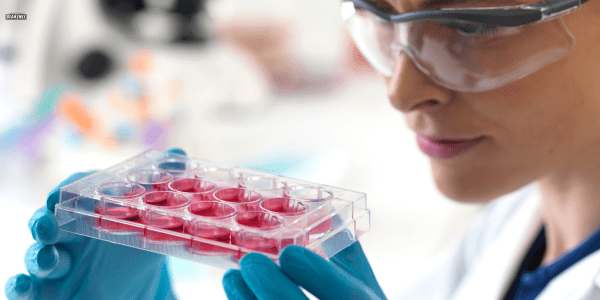
Cell Research
The Ultimate in Versatile Irradiation Technology
The Rad Source RS 1800 Q X-ray Irradiators are engineered for cutting-edge biological research, offering unmatched versatility for a wide range of applications.
From cells and tissue cultures to seeds, stem cells, blood products, and other biological samples, these powerful irradiators provide the precision and flexibility needed to explore complex biological responses across numerous life science disciplines, including cancer research, immunology, and genetics.

The Most Powerful Dedicated Cell Irradiator Available
Cancer researchers utilize our patented x-ray irradiation technology to assess the effects of radiation on different types of cancer cells in laboratory experiments, enabling them to more accurately predict the outcomes of radiation therapy in cancer patients.
Cancer cells are normal cells that have suffered genetic mutations in their DNA that cause them to multiply uncontrollably and escape death. Cancer cells display several “hallmark” behaviors that are characteristic of cells from all types of cancer, but individual types of cancer differ greatly in other behaviors, particularly in their response to radiation.
It is critical for cancer researchers to evaluate the effects of radiation on cancer cells in the laboratory because this will lead to safer and more effective treatments for human cancer patients undergoing radiation therapy in the hospital or clinic.
Patented Quastar® Photonic Decontamination™ Technology
Our patented x-ray irradiation technology is the preferred method to simulate radiation therapy in the laboratory, enabling cancer researchers to perform experiments that show how cancer cells gain resistance to radiation and other experiments that evaluate the collective effect of new drugs or doses in combination with radiation therapy.

The Quastar™ x-ray emitter produces a high x-ray output and has a large field, providing the scientist with the flexibility for many application configurations for high throughput and dose rate.
Better Uniformity
Due to a larger field with no need to collimate the beam, a better uniformity can be achieved compared to imaging tube x-ray technology.
Direct Replacement for Gamma Irradiator
The U.S. Government has recognized x-ray to be a safe, direct alternative – for radioactive isotope (gamma) source irradiators.

RS 1800 Q Biological Irradiator
The 1800∙Q is designed around the proprietary QUASTAR™ X-ray platform built specifically for life science applications. The most powerful cell irradiator available for cell and tissue biological research. Applications include cancer research, immunology, feeder cell arrestment, hybridoma cells, stem cells, apoptosis, and seeds.
Latest News & Studies
Apoptosis Induced by Knockdown of uPAR and MMP-9 is Mediated by Inactivation of EGFR/STAT3 Signaling in Medulloblastoma
Medulloblastoma is a highly invasive cancer of central nervous system diagnosed mainly in children. Matrix metalloproteinase-9 (MMP-9) and urokinase plasminogen activator receptor (uPAR) are over expressed in several cancers and...
Thioridazine Sensitizes Esophageal Carcinoma Cell Lines to Radiotherapy-Induced Apoptosis In Vitro and In Vivo
Combined treatment with thioridazine and irradiation significantly reduced viability of ESCC cells compared with thioridazine or irradiation treatment alone. Thioridazine and irradiation treatment induced G0/G1 phases cell cycle...
Short Communication: Nanoparticle Thermotherapy and External Beam Radiation Therapy for Human Prostate Cancer Cells
Abstract: Nanoparticle thermotherapy (NPTT) uses monoclonal antibody-linked iron oxide magnetic nanoparticles (bioprobes) for the tumor-specific thermotherapy of cancer by hysteretic heating of the magnetic component of the...




